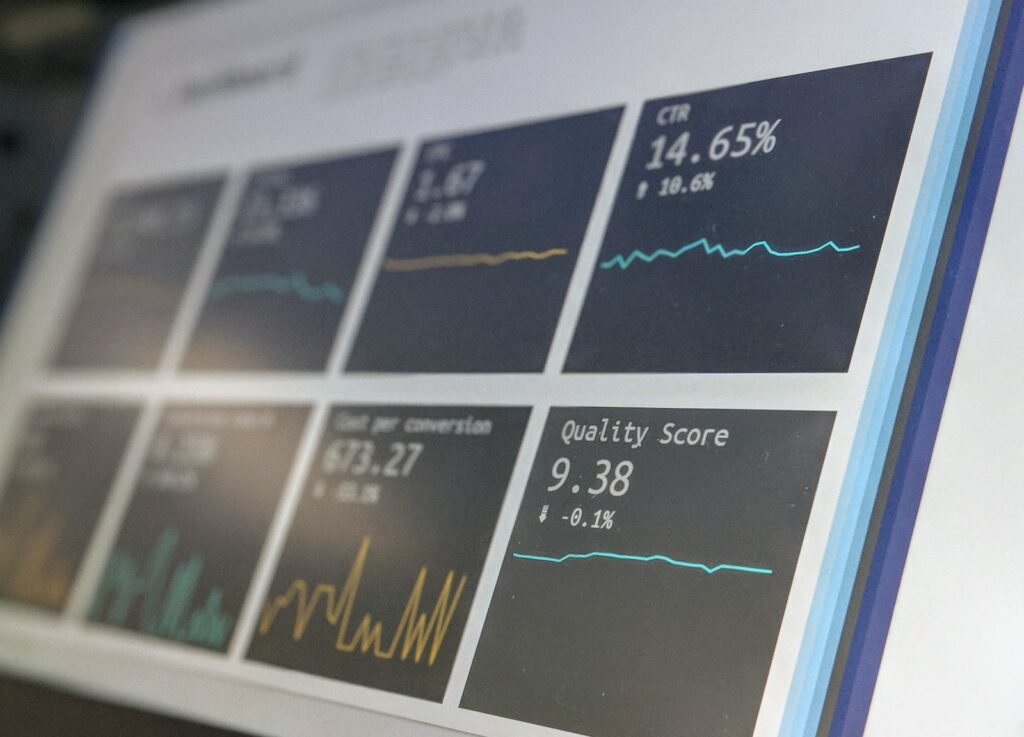Hey, just so you know, some of the links on this site are affiliate links. That means I may earn a small commission if you buy something through them. It doesn’t cost you anything extra, and it helps me keep this site running. Thanks for your support!
Intro
In today’s rapidly evolving digital landscape, it’s crucial for businesses and employees to stay ahead of the game. The workplace of the future is constantly changing, and staying up to date with the latest technology is essential for success. That’s why we’ve identified the 7 tech trends that will dominate the workplace in the next 5 years. These transformative technologies have the power to reshape the future of work, and it’s important to embrace them now in order to stay ahead of the curve. From AI and AR/VR to blockchain and cybersecurity, let’s explore these 7 tech trends and how they will impact the future of work.

1) Artificial Intelligence (AI): Shaping a Smarter Workplace
Artificial Intelligence (AI) is revolutionizing the way we work and shaping a smarter workplace. With its ability to analyze vast amounts of data, AI enables businesses to make better-informed decisions, automate tedious tasks, and optimize operations. This transformative technology is not only streamlining processes but also driving workplace transformation.
One of the key components of AI is machine learning, which allows systems to learn and improve from experience without being explicitly programmed. This means that AI systems can continuously learn and adapt, making them invaluable assets in a fast-paced business environment. From customer service chatbots to predictive analytics, machine learning algorithms are revolutionizing how businesses interact with their customers and make strategic decisions.
Furthermore, the integration of AI with blockchain technology has the potential to reshape the workplace even further. Blockchain technology, with its decentralized and secure nature, can enhance trust, transparency, and efficiency in various business processes. AI and blockchain together can revolutionize supply chain management, financial transactions, and data security, creating a smarter and more reliable workplace.
2) The Emergence of Augmented Reality/Virtual Reality (AR/VR) in Workspaces
Augmented Reality (AR) and Virtual Reality (VR) are no longer just concepts from science fiction movies; they are rapidly becoming a reality in workspaces across industries. AR/VR technologies are revolutionizing the way businesses operate, collaborate, and interact with their customers.
In the coming years, AR/VR will continue to emerge as a dominant force in the workplace, transforming traditional workflows and enhancing productivity. Imagine being able to attend a virtual meeting with colleagues from different parts of the world without leaving your office. With AR/VR, this is now possible. Companies are using these technologies to create immersive virtual meeting spaces where employees can collaborate in real-time, regardless of their physical locations.
AR/VR is also revolutionizing employee training and development. Instead of relying on traditional training methods, businesses can now provide employees with interactive and engaging virtual training experiences. From simulated hands-on experiences to interactive tutorials, AR/VR is transforming how employees acquire new skills and knowledge.
Moreover, AR/VR is transforming the customer experience. Businesses can now offer their customers virtual tours of properties, virtual product demonstrations, and immersive shopping experiences. This technology has the potential to revolutionize the retail, real estate, and tourism industries, among others.
3) The Impact of the Internet of Things (IoT) on Daily Business Operations
The Internet of Things (IoT) is set to revolutionize daily business operations in the next 5 years. IoT refers to the network of interconnected devices that can communicate and exchange data with each other, bringing automation, efficiency, and insights to the workplace like never before.
With IoT, businesses can collect real-time data from various sensors and devices, enabling them to make data-driven decisions and optimize their operations. For example, in manufacturing, IoT can enable machines to communicate with each other, allowing for predictive maintenance and reducing downtime. In logistics, IoT can provide real-time tracking of shipments, improving supply chain efficiency. And in healthcare, IoT can monitor patient health remotely, leading to better patient outcomes.
Moreover, IoT has the potential to transform customer experience. With connected devices, businesses can provide personalized and proactive services to their customers. For example, a smart home system can automatically adjust the temperature, lighting, and security settings based on the homeowner’s preferences. In retail, IoT can enable personalized marketing messages and targeted promotions based on customer preferences and behavior.
However, with the increasing number of connected devices, security becomes a major concern. It is crucial for businesses to ensure the security of their IoT devices and the data they collect. Implementing robust security measures, such as encryption and authentication protocols, is essential to protect against potential cyber threats.

4) The Advancements in Cloud Computing and Its Impact on Workplace Flexibility
Cloud computing has revolutionized the way businesses operate and has had a significant impact on workplace flexibility. With the advancements in cloud technology, employees are no longer tied to their physical office spaces and can work from anywhere, anytime.
One of the key benefits of cloud computing is its ability to provide remote access to files, documents, and applications. This means that employees can access their work-related data and tools from any device with an internet connection, whether it’s a laptop, tablet, or smartphone. This level of flexibility allows for increased collaboration and productivity, as employees can work together on projects in real-time, regardless of their physical location.
Furthermore, cloud computing enables businesses to scale their operations easily. Instead of investing in expensive hardware and software infrastructure, businesses can leverage cloud-based services and solutions. This means that as the business grows, it can easily increase its storage capacity, computing power, and other resources, without the need for costly and time-consuming hardware upgrades.
Another important aspect of cloud computing is its impact on data security and disaster recovery. Cloud providers often have robust security measures in place to protect data from potential breaches and cyber threats. Additionally, by storing data in the cloud, businesses can ensure that their information is backed up and easily recoverable in the event of a system failure or data loss.
Overall, cloud computing has revolutionized workplace flexibility by providing remote access, scalability, and enhanced security. Businesses that embrace cloud technology can create a more flexible and adaptable work environment, allowing employees to work efficiently and collaboratively, regardless of their physical location.
5) Cybersecurity: A Non-Negotiable Essential for Businesses
In today’s digital landscape, cybersecurity is no longer just an option for businesses—it’s an absolute necessity. With the increasing reliance on technology and the rise in cyber threats, protecting sensitive information and data has become a non-negotiable essential.
Cyberattacks can have devastating consequences for businesses, ranging from financial loss to damage to reputation and customer trust. That’s why it’s crucial for organizations to prioritize cybersecurity measures to safeguard their operations and assets.
One of the key aspects of cybersecurity is ensuring the confidentiality, integrity, and availability of data. This involves implementing robust security protocols, such as firewalls, encryption, and multi-factor authentication, to prevent unauthorized access and data breaches. Regularly updating and patching software and systems is also crucial to address any vulnerabilities that hackers may exploit.
Another important element of cybersecurity is employee education and awareness. Human error is often a leading cause of security breaches, so it’s essential to train employees on best practices for data protection, such as creating strong passwords, identifying phishing emails, and securely handling sensitive information.
Furthermore, businesses must have a comprehensive incident response plan in place to effectively respond to and recover from cyber incidents. This includes regularly backing up data, monitoring network activity, and having a dedicated team to handle security incidents.
In today’s digital world, cybersecurity is no longer an afterthought—it’s a fundamental aspect of running a business. By investing in robust cybersecurity measures, organizations can protect their data, safeguard their operations, and ensure the trust and confidence of their customers. Don’t wait until it’s too late—make cybersecurity a top priority for your business today.
6) Robotic Process Automation (RPA): Redefining Efficiency at Work
Robotic Process Automation (RPA) is revolutionizing the way we work and redefining efficiency in the workplace. With RPA, businesses can automate repetitive, rule-based tasks that were previously performed by humans, freeing up valuable time and resources for more strategic and complex activities.
RPA software, also known as “bots,” can perform tasks such as data entry, report generation, and invoice processing with speed and accuracy. By eliminating human error and reducing manual intervention, RPA not only improves operational efficiency but also enhances data quality and compliance.
The benefits of RPA extend beyond efficiency gains. It also allows employees to focus on more meaningful and creative work, ultimately increasing job satisfaction and engagement. Additionally, RPA can scale operations without the need for additional human resources, enabling businesses to handle increased volumes of work without incurring significant costs.
Furthermore, RPA can integrate with existing systems and software, making it a versatile and adaptable tool for businesses of all sizes and industries. Whether it’s finance, HR, or customer service, RPA can streamline processes and enhance productivity across various functions.
As RPA continues to evolve, the potential for its application in the workplace is immense. From automating complex workflows to intelligent data analysis, RPA has the power to transform how businesses operate and drive efficiency to new heights.
To stay ahead of the curve and harness the full potential of RPA, businesses should invest in understanding their processes and identifying opportunities for automation. By embracing RPA, organizations can redefine efficiency at work and unlock a world of possibilities for their employees and customers.
7) The Transformational Power of Blockchain in Businesses
Blockchain technology has emerged as a game-changer in the business world, with its transformational power being recognized across industries. From finance and supply chain management to healthcare and real estate, blockchain has the potential to revolutionize how businesses operate and interact with their customers.
At its core, blockchain is a decentralized and secure digital ledger that records transactions across multiple computers. This technology provides transparency, immutability, and trust, making it ideal for a wide range of applications. One of the key benefits of blockchain is its ability to eliminate intermediaries and streamline processes, leading to increased efficiency and cost savings.
In finance, blockchain can revolutionize the way transactions are conducted, making them faster, more secure, and less expensive. With blockchain-based smart contracts, parties can automate and enforce agreements without the need for intermediaries, reducing the risk of fraud and error.
Supply chain management is another area where blockchain can have a transformative impact. By providing a transparent and immutable record of the entire supply chain, businesses can track and verify the origin and authenticity of products, ensuring ethical and sustainable practices.
In healthcare, blockchain can improve data security and interoperability, allowing for secure sharing of patient records across healthcare providers. This can lead to better patient outcomes, reduced healthcare costs, and improved collaboration among healthcare professionals.
The real estate industry can also benefit from blockchain technology, as it enables transparent and efficient property transactions. Blockchain-based platforms can streamline the buying, selling, and leasing of properties, reducing the need for intermediaries and minimizing the risk of fraud.
Overall, the transformative power of blockchain in businesses is undeniable. By embracing this technology, organizations can streamline processes, enhance transparency, and create new opportunities for growth and innovation. Whether it’s finance, supply chain management, healthcare, or real estate, blockchain has the potential to reshape the way businesses operate and deliver value to their customers. Now is the time to harness the transformative power of blockchain and stay ahead of the competition.




